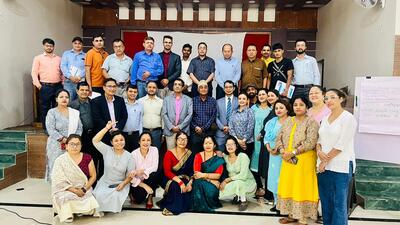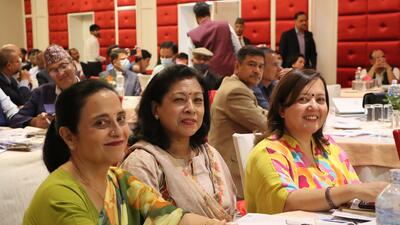

ITC to survey non-tariff measures in Nepal and develop sector export strategies
(Geneva/Kathmandu) – The International Trade Centre (ITC) is to carry out a large-scale business survey to document experiences of Nepali exporters facing non-tariff measures (NTMs). ITC is also to develop four national-level sector export strategies (SES) for the Government of Nepal. The two initiatives are being implemented following an official request from the Ministry of Commerce and the recent review of the Nepal Trade Integration Strategy (NTIS) 2015.
The two initiatives were launched on 17 March at a stakeholder meeting at the Ministry of Commerce, which included representatives from several ministries and government agencies, trade support institutions, the private sector and development partners.
The business survey on NTMs will capture procedural and regulatory barriers to trade that exporters experience in partner countries, in transit or in Nepal. It will be implemented in partnership with the Federation of Nepalese Chambers of Commerce and Industry (FNCCI) and will be based on the established ITC methodology for NTM Surveys that has been applied in more than 60 developing and developed countries. More than 600 interviews will be carried out between March and June by a team of 15 interviewers from the Kathmandu University School of Management (KUSOM). All the interviewers have received extensive training by ITC.
Interviews will target companies in all export sectors across the different districts in Nepal, with a special focus on the products covered by the SES and priority products identified in the NTIS. The collected data will allow for a detailed analysis by product and partner country, as well as of private-sector concerns with trade regulations. The survey results will serve as a basis for stakeholder consultations, which will identify recommendations for specific interventions in affected sectors and will feed into the SES development process.
‘We highly encourage exporters to participate in the survey to make the private-sector voice heard,’ said Mina Aryal, Under-Secretary at the Ministry of Commerce.
ITC Executive Director Arancha González said: ‘The impact of NTMs is especially significant on companies exporting from landlocked developing countries, such as Nepal. Since NTMs represent fixed costs for businesses, they have an even bigger impact on small and medium-sized enterprises.
‘ITC and Nepal have a long-standing relationship and we will continue to support the country in identifying and removing barriers to help businesses contribute more to economic growth and sustainable development,’ she said.
Santosh Chandra Kunwar of the Federation of Nepalese Chambers of Commerce and Industry’s (FNCCI) Export Promotion Committee said: ‘The survey will allow us to demonstrate the difficulties we face on a daily basis and to take action on those that Nepal can address or influence. The specific sector export strategies will help Nepal to do so.’
The SES will be developed in parallel to and be aligned with the NTM Survey. A specific focus of the SES will be on the coffee, tea, large cardamom and handmade paper sectors. The SES design process will produce a set of four endorsed, coherent and comprehensive documents that will serve as action-oriented blueprints for enhancing trade performance in each sector.
The design phase will follow ITC’s recognized strategy design process and methodology, which includes a thorough and participative diagnostic of each sector’s performance, main markets and competitors over the past five years as well as highlight opportunities and strategic implications for the coming five years.
The two initiatives are based on full country ownership and involve in-depth consultations with partners in identifying challenges and developing solutions. This includes identifying supply-side constraints and opportunities for value addition, diversification and investment specific to each sector. Each SES will also link trade-specific issues to broader developmental dimensions, such as each sector's potential impact on poverty reduction, employment generation and sustainable development.
‘Developing Nepal’s exports is key to achieving the United Nations’ Sustainable Development Goals,’ said Naindra Prasad Upadhyaya, Secretary of the Ministry of Commerce and coordinator of ITC interventions. ‘The two initiatives we started today will enable Nepali businesses to benefit from market opportunities, reduce trade cost and contribute to sustainable export development.’
About ITC - ITC is the joint agency of the World Trade Organization and the United Nations. ITC assists small and medium-sized enterprises in developing and transition economies to become more competitive in global markets, thereby contributing to sustainable economic development within the frameworks of the Aid-for-Trade agenda and the Sustainable Development Goals. For more information, visit www.intracen.org. Follow ITC on Twitter: @ITCnews
Media interested in speaking to ITC technical experts are requested to please contact the below ITC representatives or visit www.ntmsurvey.org/nepal.
Contacts ITC:
Jarle
Hetland Phone: +41
22 730 0145 E: Hetland [at] intracen.org (Hetland[at]intracen[dot]org)
|
Samidh Shrestha Analyst, Non-Tariff Measures Programme E: shrestha [at] intracen.org (shrestha[at]intracen[dot]org)
Olivier Marty Adviser, Trade Strategy and Competitiveness E: marty [at] intracen.org (marty[at]intracen[dot]org)
|















